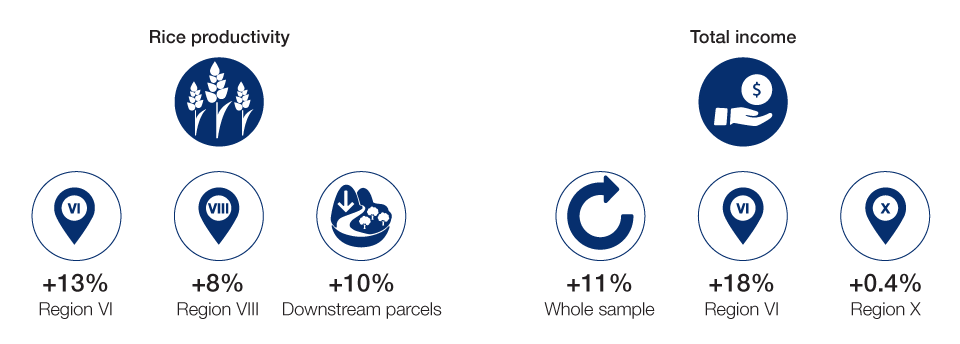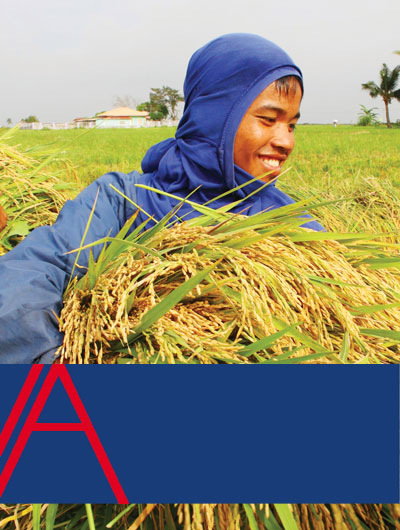Impact assessment: Irrigated Rice Production Enhancement Project
Impact assessment: Irrigated Rice Production Enhancement Project
The Irrigated Rice Production Enhancement Project (IRPEP) was implemented between 2010 and 2015 to improve the rice productivity and livelihoods of smallholder farmers who cultivate on Communal Irrigation Schemes in three regions (Western Visayas, Central Visayas and Northern Mindanao) of the Philippines. The programme rehabilitated the infrastructure of existing Communal Irrigation Schemes (CIS), and the rice farmers who managed the schemes through Irrigators' Associations were trained in management and leadership to improve their ability to manage the schemes, and thereby achieve increased and more sustainable crop production. IRPEP also provided complementary marketing support, Farmer Field Schools and emergency seed buffer stock to smallholder rice farmers.
IFAD undertook a rigorous impact assessment of IRPEP shortly after its completion focusing on the canal infrastructure rehabilitation, capacity development and marketing support provided to smallholder farmers, as the Farmer Field Schools and seed buffer stocks were provided nationwide by the Government of the Philippines.
Key impact estimates
An impact estimate is calculated as the difference in mean outcomes between the treatment group (project participants) and the comparison group (non-participants). IRPEP made important achievements in relation to increasing equitable water delivery across all three regions with the poorer and most vulnerable farmers who typically cultivate further downstream from the irrigation source witnessing a 10 per cent increase in rice yields compared to 2.5 per cent for up and midstream farmers. The onset of Super Typhoon Haiyan caused severe weather damage in the Central Visayas region, which meant that farmers did not benefit from increased water delivery. Key figures include:

Main lessons
The diverse quantitative and qualitative results recorded across the three regions in the IRPEP assessment provide insightful learnings for future projects and development policy formulation in similar contexts.
- Supplementary support is required when households are coping with extreme weather conditions. While decentralised irrigation management can be a tool to shield farmers from climate shocks, additional support such as the Communal Irrigation Development Fund for post-shock rehabilitation, can further shield farmers in severely affected areas.
- Production efficiency does not automatically increase with improved irrigation supply due to increasing expenditure on water and other inputs. Additional support is therefore necessary to ensure that yields increase in proportion with such costs.
- Poorer farmers either limited their use of production inputs due to lack of capital or purchased inputs on credit, forcing them to use part of their harvest to pay back loans rather than for sales. Future programming should address farmers' limited access to capital for production inputs to enable them sufficiently benefit from their increased rice yield.
- Marketing components in similar projects should be rethought and adapted to the needs and preferences of rural farmers. More research is needed on whether, and how, to encourage collective marketing.
- Farmers whose rice income increased also reduced their livelihood diversity due to heavy concentration on rice cultivation. Future projects should therefore provide opportunities for diversification to avoid dependence on staple crops and facilitate well-functioning markets to generate greater gains for rural farmers who chose to specialize.
IRPEP is one of two sub-programmes of the Rapid Food Production Enhancement Programme (RaFPEP) in the Philippines.
